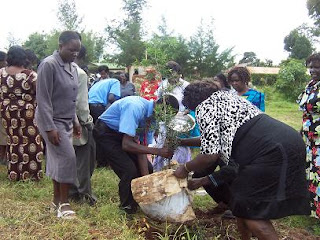When practical permaculture principles are explained to farmers, gardening is transformed from a task to a craft. Farmers say that this type of agriculture is not complicated. It is a straightforward way of raising more food to feed people while protecting the environment. Permaculture is simple, sound, equitable, low cost and a biological-based alternative. As more farmers adopt it, the sustainabliity of their farms increases because farmers are learning to test and to refine these alternatives.
Farmers are helping each other become revolution artists who grow food so that their communities can be whole and powerful again.
All of the farmers groups are being taught to consider these factors before they start gardening:
(a) How to choose a field
(b) How to build soil
(c) How to rotate crops
(d) When is the best time to plant
(e) What plants should populate the garden
(f) What are the best seed practices
(g) How to fertilize
(h) How to control weeds
(i) How to control insects
(j) What are the principles of harvesting
Practical / field work
Experiential learning helps farmers internalize technological knowledge. OTEPIC programs take the farmer trainees into the garden to apply the principles taught in the classroom.
We encourage farmers to use open pollinated seed and explain the advantages of using local varieties. We teach them how to select seeds.
Farmers set up their small gardens and make compost and, as a result, get more food to eat and share with neighbors. These small farms are where agricultural advances are nurtured and new ideas conceived by people solving nature's puzzles.






























